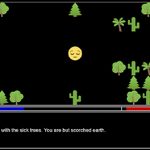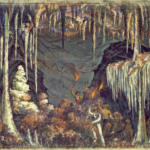critical ecologies
Greening the Digital Muse: An Ecocritical Examination of Contemporary Digital Art and Literature

By now, Cultural Ecology, Ecocriticism, and Environmental Humanities can tell us all we need to know about climate change. What's still needed, however, is for authors and artists to reconceptualize environmental issues as social and human questions rather than mere technical ones.
Notes on a Civics For The Sixth Extinction

Citing Catherine Gallagher on `fictionality’ as the `ontological ground of the novel,’ LeMenager seeks a similar `alternative grounding’ for progressive, transgenerational social change in a time of epistemic and ecological crisis. The essay is one of many selected for co-production in ebr and our two collections from Bloomsbury Academic, Post-Digital: Critical Debates from electronic book review .
“The Effulgence of the North”: An Introduction to the Natural Media Gathering

This collection emerges from a panel hosted by the Modern Language Association's MS Forum on Visual Media (http://naturalmedia.org/titles/) in 2017. "Natural media" re-valuates the communicative potential of natural spaces, especially in instances where symbolic import collides with raw matter in a manner that hides from, disguises, or elides stark reality. It considers intersections, collisions, tensions, opportunities, and affordances that arise in the discussion of "Natural Media," both broadly conceived and in its contributors' particular areas of research. It is also in close conversation with research inspired by a previous gathering on a closely related topic: Digital and Natural Ecologies.
Climate Bot Panegyric: An Interview with Nigel Leck

Can we again devise bots, in the tradition of Nigel Leck's AI_AGW, capable of staving off environmental disaster and saving humanity from its own stupidity? Twitter has censored this particular bot that Leck created ¨with the singular mission of hunting down false claims made by climate change deniers, calling them out, and correcting them with information linked from peer-reviewed essays in scientific research journals.¨ With this interview, ebr and our Natural Media co-editors celebrate and memorialize this noble, though brief realization of the critical and creative potential of community built digital media.
Between Plants and Polygons: SpeedTrees and an Even Speedier History of Digital Morphogenesis

Toward a more expansive standard of botanical, graphical, ecosystemic and (not least) digital realism.